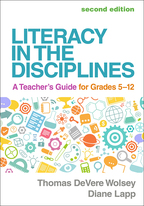Literacy in the Disciplines
Second Edition
A Teacher's Guide for Grades 5-12
Thomas DeVere Wolsey and Diane Lapp
HardcoverPaperbacke-bookprint + e-book
Hardcover
orderOctober 1, 2024
ISBN 9781462555314
Price: $59.00 282 Pages
Size: 7" x 10"
Paperback
orderJuly 26, 2024
ISBN 9781462555307
Price: $39.00 282 Pages
Size: 7" x 10"
e-book
orderJuly 30, 2024
PDF and Accessible ePub ?
Price: $39.00 282 Pages
ePub is Global Certified Accessible
print + e-book $78.00 $46.80
orderPaperback + e-Book (PDF and Accessible ePub) ?
Price: 282 Pages
ePub is Global Certified Accessible
The reproducible materials can be downloaded and printed in PDF format.
This successful guide—now in a revised and expanded second edition—gives teachers effective strategies to support adolescents' development of relevant literacy skills in specific disciplines. Demonstrating why disciplinary literacies matter, the authors discuss ways to teach close reading of complex texts; discipline-specific argumentation, communication, and writing skills; academic vocabulary; and more. The book draws on revealing interviews with content-area experts and professionals in history, science, mathematics, literature, the arts, and physical education. Teacher-friendly tools include 21 reproducible forms that also can be downloaded and printed, “Try It On!” practice activities, lesson plans, chapter anticipation guides, and links to recommended online teaching videos.
New to This Edition
New to This Edition
- Chapter on assessment.
- Chapter on disciplinary literacies beyond school—in civic, professional, and personal life.
- Expanded coverage of math, more attention to evidence and sources used in different disciplines, new and updated expert interviews, and advice on how both teachers and students can use AI tools productively.
- Anticipation guides that invite reflection on key questions before, during, and after reading most chapters.



